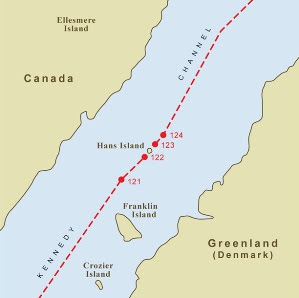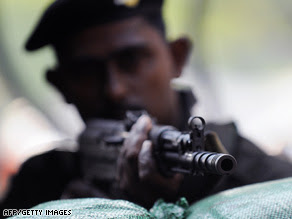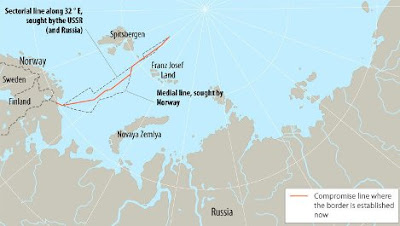Efforts to settle decades-old claims to the arctic got a major boost last week when on 16th September Norway and Russia signed the 'Barents Sea Pact', which divided an 175,000sq km section of the Barents Sea between them.
Norwegian Prime Minister Jens Stoltenberg and Russian President Dmitry Medvedev signed the historical agreement in the Russian city of Murmansk on Wednesday.
“The treaty resolves what for several decades remained the most important outstanding issue between Norway and Russia,” Stoltenberg stated. “It sends an important signal to the rest of the world - the Arctic is a peaceful region where any issues that arise are resolved in accordance with international law.”
Much of the Arctic has been disputed between five nations – Russia, Norway, Canada, US and Denmark, for many decades, but as polar ice caps recede, making shipping and oil and gas exploration opportunities more feasible, the importance of delimitation has become increasingly important. It is thought that up to a quarter of the world's untapped oil and gas could lie in the region.
The dispute between Norway and Russia first received attention in 1957, when a short section of their maritime boundary, from the land boundary terminus through the confines of Varangerfjord was designated. This boundary was extended through Varangerfjord in 2007, but disputes continued over the lengthy section extending northwards through the Barents Sea and into the Arctic Ocean.
Norway argued for a median line boundary, while Russia (and previously the Soviet Union) advocated a 'sectorial' approach, which would have extended the boundary north along the 32° 4' 35" E meridian. The boundary agreed last week is a compromise between the two positions, as it sits eastward of a strict median line, but west of the sectorial line. The agreement also includes a provision for a 'special area' that is east of the boundary, but is within 200 nautical miles of the Norwegian mainland where Russia is granted exclusive economic rights.
Norway has used the occasion to encourage the other polar nations to follow their example and resolve disputes in the region. Canadian Foreign Minister, Lawrence Canon visited Russia and Norway last week, but talks with Russian Foreign Minister Sergey Lavrov have not brought the two sides closer together.
The Canadian–Russian dispute centres around the Lomonosove Ridge, an underwater mountain range running along the floor of the Arctic Ocean from Siberia to Canada's Ellesmere island. Both countries claim that the underwater mountain range is an extension of their continental shelves. The dispute has been referred to the UN. 
Canada has a similarly stalled dispute with Denmark over Hans Island, a small inhabited barren knoll which lies in the middle of the Nares Strait, between Ellesmere Island and Denmark's Greenland Territory.
A 1973 treaty between the two arctic countries plotted 127 points delimiting the border, however the treaty did not connect the dots and the island lies in between two points. The dispute flared up in 2004 and 2005 after government officials from both countries visited the island, but no progress has been made in moving towards settlement.
More progress has been made on Canada's dispute with the US over the Beaufort Sea. Ministers of the two countries met to discuss the issue in late July, and for the third summer in a row, researchers from both countries worked in the region mapping the sea floor.
A separate, but related concern is the issue of control over the Northwest Passage, which, due to retreating polar ice caps, is increasingly being seen as a shipping shortcut between Asia and Europe. Ottawa says that the Northwest Passage is Canadian sovereign water, but Washington and several other nations regard it as an international passage.
Despite these ongoing disputes, the fact that Norway and Russia were able to find a settlement, which still needs to be ratified by both of their parliaments, means that diplomatic solutions will probably prevail for other disputes in the future.
Sources: IBRU, CTV, Nunatsiaq Online




